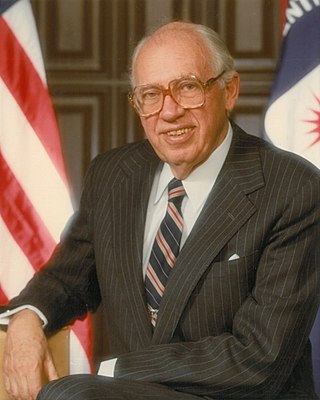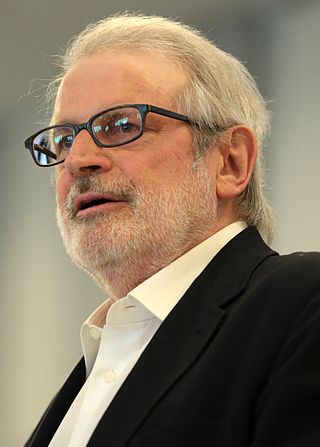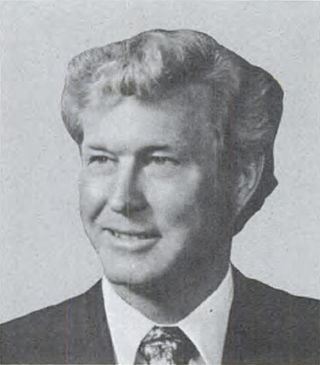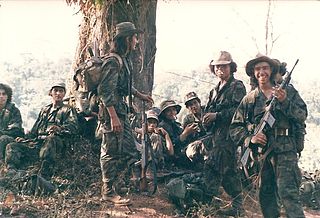Related Research Articles

The Iran–Contra affair, often referred to as the Iran–Contra scandal, was a political scandal in the United States that occurred during the second term of the Reagan administration. Between 1981 and 1986, senior administration officials secretly facilitated the illegal sale of arms to Iran, which was subject to an arms embargo at the time. The administration hoped to use the proceeds of the arms sale to fund the Contras, an anti-Sandinista rebel group in Nicaragua. Under the Boland Amendment, further funding of the Contras by legislative appropriations was prohibited by Congress, but the Reagan administration figured out a loophole by secretively using non-appropriated funds instead.

The 1980 United States presidential election was the 49th quadrennial presidential election, held on November 4, 1980. The Republican nominee, former California governor Ronald Reagan, defeated incumbent Democratic President Jimmy Carter in a landslide victory.

Jesse Alexander Helms Jr. was an American politician. A leader in the conservative movement, he served as a senator from North Carolina from 1973 to 2003. As chairman of the Senate Foreign Relations Committee from 1995 to 2001, he had a major voice in foreign policy. Helms helped organize and fund the conservative resurgence in the 1970s, focusing on Ronald Reagan's quest for the White House as well as helping many local and regional candidates.

William Joseph Casey was an American lawyer who was the Director of Central Intelligence from 1981 to 1987. In this capacity he oversaw the entire United States Intelligence Community and personally directed the Central Intelligence Agency (CIA).

During presidential election campaigns in the United States, it has become customary for the candidates to engage in one or more debates. The topics discussed in the debate are often the most controversial issues of the time, and arguably elections have been nearly decided by these debates. Candidate debates are not constitutionally mandated, but they are now considered an intrinsic part of the election process. The debates are targeted mainly at undecided voters; those who tend not to be partial to any political ideology or party.

David Alan Stockman is an American politician and former businessman who was a Republican U.S. Representative from the state of Michigan (1977–1981) and the Director of the Office of Management and Budget (1981–1985) under President Ronald Reagan.

George Frederick Will is an American libertarian conservative writer and political commentator, who writes regular columns for The Washington Post and provides commentary for NewsNation. In 1986, The Wall Street Journal called him "perhaps the most powerful journalist in America." Will won the Pulitzer Prize for Commentary in 1977.
In politics, opposition research is the practice of collecting information on a political opponent or other adversary that can be used to discredit or otherwise weaken them. The information can include biographical, legal, criminal, medical, educational, or financial history or activities, as well as prior media coverage, or the voting record of a politician. Opposition research can also entail using "trackers" to follow an individual and record their activities or political speeches.

Ronald Reagan's tenure as the 40th president of the United States began with his first inauguration on January 20, 1981, and ended on January 20, 1989. Reagan, a Republican from California, took office following his landslide victory over Democrat incumbent president Jimmy Carter and independent congressman John B. Anderson in the 1980 presidential election. Four years later, in the 1984 presidential election, he defeated former Democratic vice president Walter Mondale, to win re-election in a larger landslide. Due to U.S. Constitutional law, Reagan was limited to two terms and was succeeded by his vice president, George H. W. Bush, who won the 1988 presidential election. Reagan's 1980 landslide election resulted from a dramatic conservative shift to the right in American politics, including a loss of confidence in liberal, New Deal, and Great Society programs and priorities that had dominated the national agenda since the 1930s.

Donald Joseph Albosta was an American farmer, businessman, and politician from the U.S. state of Michigan. He served three terms in the United States House of Representatives from 1979 to 1985.
The 1980 October Surprise theory refers to an allegation that representatives of Ronald Reagan's presidential campaign made a secret deal with Iranian leaders to delay the release of American hostages until after the election between Reagan and President Jimmy Carter, the incumbent. The detention of 66 Americans in Iran, held hostage since November 4, 1979, was one of the leading national issues during 1980, and the alleged goal of the deal was to thwart Carter from pulling off an "October surprise". Reagan won the election, and, on the day of his inauguration—minutes after he concluded his 20-minute inaugural address—the Islamic Republic of Iran announced the release of the hostages.
In the politics of the United States, an October surprise is a news event that may influence the outcome of an upcoming November election, whether deliberately planned or spontaneously occurring. Because the date for national elections is in early November, events that take place in October have greater potential to influence the decisions of prospective voters and allow less time to take remedial action; thus, relatively last-minute news stories could either change the course of an election or reinforce the inevitable. The term "October surprise" was coined by William Casey when he served as campaign manager of Ronald Reagan's 1980 presidential campaign. However, there were October election-upending events that predated the coining of the term.
The presidency of Ronald Reagan was marked by numerous scandals, resulting in the investigation, indictment or conviction of over 138 administration officials, the largest number for any president of the United States.

United States support for Ba'athist Iraq during the Iran–Iraq War, in which it fought against post-revolutionary Iran, included several billion dollars' worth of economic aid, the sale of dual-use technology, military intelligence, and special operations training. The U.S. refused to sell arms to Iraq directly due to Iraq's ties to Palestinian groups which the U.S. designates as terrorist organizations such as the Palestinian Liberation Front and Abu Nidal Organization, but several sales of "dual-use" technology have been documented; notably, Iraq purchased 45 Bell helicopters for $200 million in 1985. Of particular interest for contemporary Iran–United States relations are accusations that the U.S. government actively encouraged Iraqi leader Saddam Hussein to invade Iran, supported by a considerable amount of circumstantial evidence and generally regarded as the conventional wisdom in the Arab world, but several scholars and former U.S. government officials deny that any such collusion occurred, and no direct documentary proof of it has been found.

Operation Cyclone was the code name for the United States Central Intelligence Agency (CIA) program to arm and finance the Afghan mujahideen in Afghanistan from 1979 to 1992, prior to and during the military intervention by the USSR in support of the Democratic Republic of Afghanistan. The mujahideen were also supported by Britain's MI6, who conducted their own separate covert actions. The program leaned heavily towards supporting militant Islamic groups, including groups with jihadist ties, that were favored by the regime of Muhammad Zia-ul-Haq in neighboring Pakistan, rather than other, less ideological Afghan resistance groups that had also been fighting the Soviet-oriented Democratic Republic of Afghanistan administration since before the Soviet intervention.

Stefan A. Halper is an American foreign policy scholar and retired senior fellow at the University of Cambridge where he is a life fellow at Magdalene College. He served as a White House official in the Nixon, Ford, and Reagan administrations, and was reportedly in charge of the spying operation by the 1980 Ronald Reagan presidential campaign that became known as "Debategate". Through his decades of work for the CIA, Halper has had extensive ties to the Bush family. Through his work with Sir Richard Billing Dearlove, he had ties to the British Secret Intelligence Service, MI6.

CIA activities in Nicaragua were frequent in the late 20th century. The increasing influence gained by the Sandinista National Liberation Front, a left-wing and anti-imperialist political party in Nicaragua, led to a sharp decrease in Nicaragua–United States relations, particularly after the Nicaraguan Revolution. In 1981, President Ronald Reagan authorized the Central Intelligence Agency to support the Contras, a right-wing Nicaraguan political group to combat the influence held by the Sandinistas in the Nicaraguan government. Various anti-government rebels in Nicaragua were organized into the Nicaraguan Democratic Force, the first Contra group, at the behest of the CIA. The CIA also supplied the Contras with training and equipment, including materials related to torture and assassination. There have also been allegations that the CIA engaged in drug trafficking in Nicaragua.

The 1980 presidential campaign of Ronald Reagan resulted in the election of Ronald Reagan and his running mate George H. W. Bush as president and vice president of the United States, defeating incumbent Democratic President Jimmy Carter and Vice President Walter Mondale.

Laurence Irwin Barrett is an American journalist and author associated with Time, for whom he worked from 1965 until his retirement in 1993.

The presidential transition of Ronald Reagan began when he won the 1980 United States presidential election, becoming the president-elect, and ended when Reagan was inaugurated at noon EST on January 20, 1981.
References
- ↑ "New book pins 'debategate' on Dem". POLITICO. Retrieved 2017-06-25.
- 1 2 Morton Kondracke, The New Republic , 18 July 1983, Debategate
- 1 2 Sperling Jr., Godfrey (June 30, 1983). "President's disclaimers may not clear air on debate-book ethics". The Christian Science Monitor .
- ↑ Hayward, Steven F. (2009). The Age of Reagan: The Fall of the Old Liberal Order: 1964-1980. Random House. ISBN 9780307453709.
- ↑ Eby, John (6 February 2011). "John Eby: Talking like trying to corral soap bubbles".
- ↑ Malone, Julia (24 May 1984). "New 'Debategate' report sharpens focus on Casey links". The Christian Science Monitor.
- ↑ Manning, Jason. "Eighties Club: Debategate".
- ↑ "Reagan Assures Casey He Can Stay as CIA Chief in New Term?". The Washington Post. September 11, 1984.
- ↑ "Campaign Papers Remain a Mystery", The New York Times, June 18, 1984.
- ↑ "Decision: The Debategate Probe Fizzles". Time . 9 July 1984.
- ↑ Banzhaf v. Smith, 588 F. Supp. 1489 & 1498, rev'd on other grounds, 737 F.2d 1167 (DC Cir. 1984). - PROF. JOHN BANZHAF'S BACKGROUND IN ANTISMOKING
- ↑ "A former Ronald Reagan campaign official charged Thursday administration..." upi.com. Retrieved 20 May 2018.
- ↑ Fresh Air , October 21, 2004; The Alabama Plainsman, July 28, 2005.
- ↑ Will, George F. (August 11, 2005). "Briefing Book Baloney". The Washington Post. p. A23.
- ↑ Carter, Jimmy (August 31, 2005). "Putting an End to the 'Briefing Book Baloney'" (Letter to the Editor). The Washington Post. p. A22.
- ↑ Shirley, Craig (2009). Rendezvous with Destiny.
- ↑ Shirley, Craig (15 October 2009). "New Book Pins 'debategate' on Democrat". Politico .